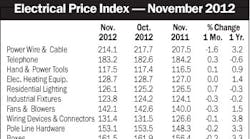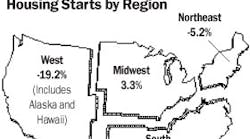WinWholesale, an equity partner in more than 400 distributors in channels that include electrical, plumbing and heating, air conditioning, and industrial PVF, has agreed to buy Noland Co., a distributor of electrical, plumbing, air conditioning, water systems and industrial products, for $74 per share.
WinWholesale plans to take Noland private and delist it from the NASDAQ stock exchange. Noland said its board unanimously recommended shareholders accept WinWholesale’s offer, which represents a 52 percent premium over the closing price of Noland shares on April 11. The tender offer was expected to start no later than April 18 and close by May 16.
Noland Co. ranked No. 88 on Electrical Wholesaling’s most recent “Top 200” with $59.2 million in electrical sales. Noland operates 101 branches in 13 states, primarily in the South, and has approximately 1,400 employees.
Winlectric, the electrical-supply segment of WinWholesale, was the subject of Electrical Wholesaling’s July 2003 cover story. With more than $106 million in 2003 electrical sales, Winlectric is ranked No. 42 on EW’s most recent “Top 200.” Winlectric has 53 locations in 20 states, according to data sent for EW’s 2005 Top 200 survey.
The acquisition would give WinWholesale a foothold in the Southeast and access to two new states —Virginia and West Virginia. It also would give WinWholesale a stronger presence in North Carolina and Pennsylvania, said Bruce Anderson, a spokesperson for WinWholesale and Winlectric.
Lloyd U. Noland, III, chairman and president of Noland, and grandson of the company’s founder, L.U. (Casey) Noland, said he felt the timing was right to sell the company, which is publicly traded but controlled by the Noland family through ownership of approximately 62 percent of the outstanding shares.
“In order to obtain the critical mass required to be a long-term player in this industry, we would have to recapitalize the company to fund accelerated growth — growth that would be a multi-year process,” said Noland. “At my age, I wasn’t willing to tackle it. In addition, the time and expense associated with complying with Sarbanes-Oxley was pushing us to consider either going private or selling. Since our most attractive alternative was to find a merger partner, I am delighted that WinWholesale has made us an attractive offer.
“Together, Noland Co. and WinWholesale represent 140 years of providing outstanding wholesaling services throughout the United States. We are pleased to entrust Noland Co.’s future in the hands of WinWholesale, a company that has demonstrated its ability to grow revenues and profits and to provide opportunities to its employees as well as value to its customers.”
Rick Schwartz, president and CEO of WinWholesale, said, “We have been looking for a partner whose geographic reach complements WinWholesale’s existing local companies. We believe WinWholesale’s and Noland’s customers will benefit from our collective 5,100 employees, 530 locations in 43 states and more than $300 million of inventory ready to serve their needs.”
Noland will continue to operate in its current branch structure under its current name until WinWholesale finalizes its plan to integrate and develop each local unit, said Anderson.
Anderson explained that changing a Noland branch to a WinWholesale branch would require a change in ownership. Each of WinWholesale’s 400-plus distributor branches is a separate corporation in which individual presidents have a substantial equity stake. WinWholesale is not ready to start considering ownership until it looks at the whole compensation package.
One of the reasons Noland appealed to WinWholesale is that little overlap exists between WinWholesale and Noland branches, said Anderson. “If we had two companies in the same geographic area, they tended to not both be in this case electrical,” he said. “One might be plumbing and the other one would be HVAC, or one might be electrical and one might be plumbing.”
Anderson said it’s not the company’s intention to consolidate branches or reduce employees. “We’re not in this to cut costs or get a quick boost to earnings or sales. We’re looking at this as a growth strategy,” he said.

